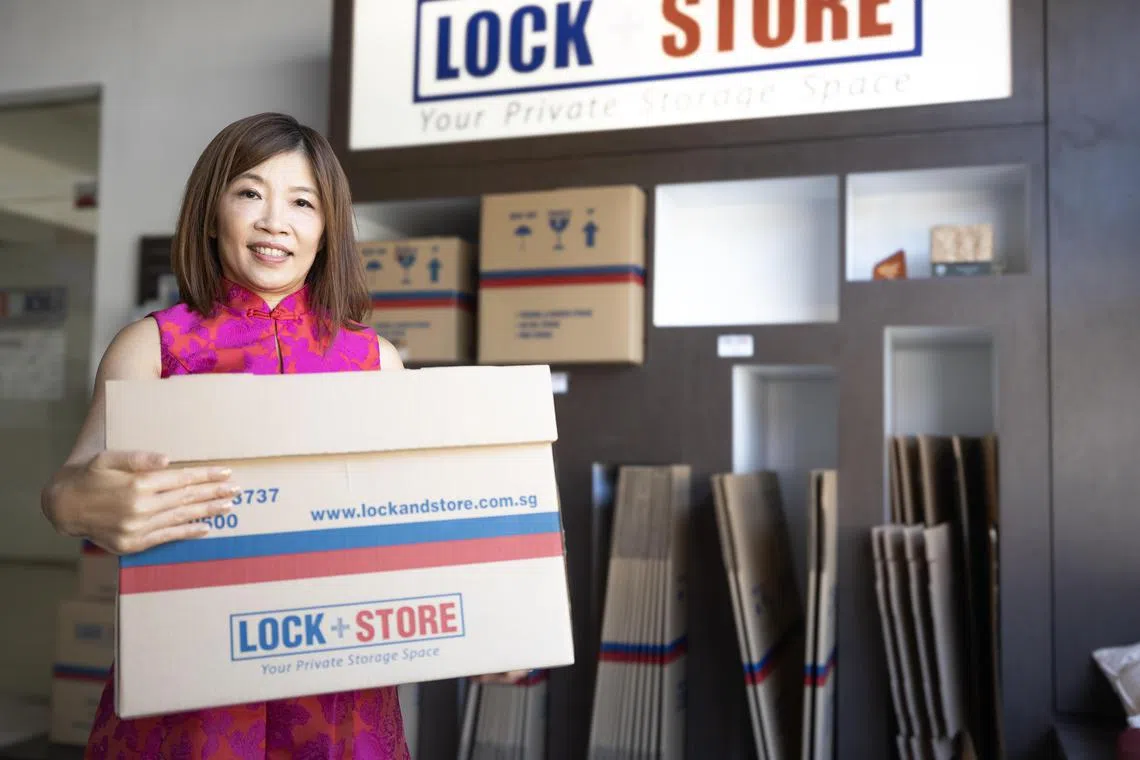Self-storage firms in 20 areas can operate until leases expire
Sign up now: Get ST's newsletters delivered to your inbox

Self Storage Association Asia chairwoman Helen Ng, CEO of General Storage Company which runs Lock+Store, said the association was happy that JTC took on board its feedback.
PHOTO: LIANHE ZAOBAO
SINGAPORE - Self-storage companies located in 20 areas around the island can stay put until their leases expire, following a review by industrial landlord JTC. The agency said it will have further discussions with the companies on the continued use of such sites for self-storage, based on Singapore’s industrial needs.
It is understood that JTC will allow self-storage facilities to be set up only in areas earmarked for light and clean industries that are not located in “core” areas.
JTC clarified that core areas are those prioritised for industrial use and include, among others, those in Boon Keng, Toa Payoh and Ang Mo Kio.
The good news, however, is that JTC has identified several locations, including Bishan, Clementi, Tampines and Woodlands, where industrial properties may be converted to self-storage use.
It said that “interested parties” can apply to JTC.
This announcement comes as JTC lifted a moratorium on the sector after a review to accommodate the increasing demand from the self-storage industry. The changes will take effect on April 1.
In a statement on Jan 24, self-storage companies will be allowed to go on operating at all their existing facilities until their leases expire. These range from two to four years at the short end, with the longer leases extending into 2030. JTC said this was to “minimise disruptions to the sector”.
According to industry data, the segment is growing at a rapid pace, with some estimates placing the expansion at a compounded growth rate of 9 to 18 per cent.
The self-storage usage space is occupied by a handful of large players such as StorHub, Extra Space, Storefriendly, Spaceship and Lock+Store, as well as fewer than 10 smaller counterparts. They cater to both individual consumers and small and medium-sized enterprises (SMEs).
However, The Straits Times understands that self-storage usage does not align with the mandated use of JTC’s industrial properties, which has to fulfil the twin roles of economic development as well as job creation.
Instead, the current tenants cater to individual clients and do not have the same economic impact as a manufacturer would.
Meanwhile, JTC said: “Following consultations with self-storage players (SSPs) on the future of the self-storage industry, JTC will be lifting its current moratorium on requests for self-storage use on JTC industrial land.” It was imposed in late 2021.
As part of the review, JTC engaged with members of the Self Storage Association Asia and other self-storage players, holding several dialogues for their views over the past two years.
“This move follows a review to accommodate increasing demand from SSPs, given the limited industrial land in Singapore to support manufacturing activities,” said the industrial landlord.
In response to JTC’s move, Self Storage Association Asia (SSAA) chairwoman Helen Ng said: “We are happy that JTC has taken on board our feedback and updated us on their plans. We continue to engage in areas of concern that could impact the availability of self-storage to SMEs and families who depend on this service.”
According to the SSAA, there is pent-up demand, with up to 17,000 SMEs depending on self-storage. Of this number, almost 54 per cent are in manufacturing or manufacturing-related industries.
“The JTC’s announcement of sample select sites for self-storage development bears scrutiny and is not, as we understand it, an exhaustive list,” said Mr Jes Johansen, president of the Singapore chapter of the SSAA.
“We also understand that some zones will be reserved solely for manufacturing, de facto excluding self-storage. This bears careful study as part of our engagement process.”
Mr Johansen, who is also chief executive of Storefriendly, added: “Uncertainty surrounding lease renewal makes it difficult, if not impossible, to move forward confidently.”
Mr Andrew Work, executive director of the SSAA, said: “Like any business sector, our industry seeks clarity to provide a reasonable degree of certainty on costs of doing business and the regulatory environment to ensure business continuity. We’re not there yet.”
CBRE research head Tricia Song concluded that SSPs with high occupancy rates are more likely to actively engage JTC to facilitate their expansion plans; and cost management will be a priority, as industrial rents have risen significantly over the past few years.



